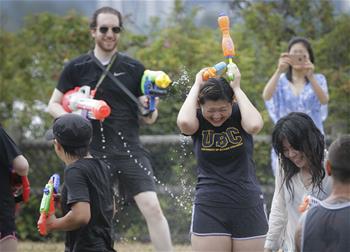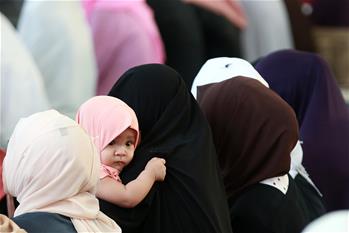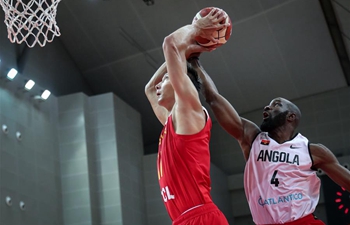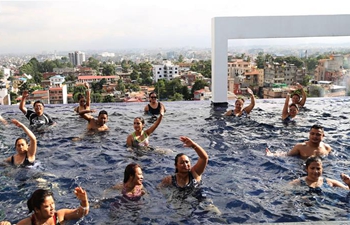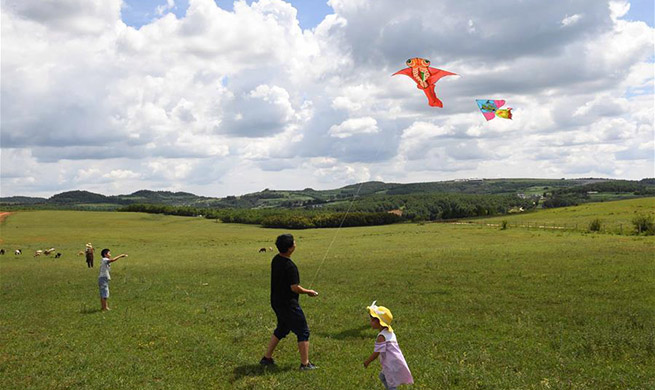by Sportswriters Yao Youming, Cao Jianjie, and Sun Liangquan
TAIYUAN, China, Aug. 11 (Xinhua) -- Does participation in sports negatively affect academics? A basketball team from a middle school in central China have proved otherwise.
The ongoing Taiyuan tournament is the second Chinese Youth Games journey for coach Peng Lijun's team, an all-girl team from Yali Middle School in Hunan Province's Changsha City. Four years ago, Peng's team defeated the Under-18 tournament champion Team Guangzhou in the group stage of the first Chinese Youth Games in Fuzhou.
But it was not just their excellent games that stunned the spectators. The players not only seized every minute their basketball experience but also academic experience. Their devotion to their studies attracted the attention of the media, which soon found out one of the student players, Zhang Yi, was admitted by Peking University, one of China's top universities.
The revelation has stirred the country, where academic performance is highly stressed due to intense competition. Media called the team the "Linsanity" phenomenon in China, a solid proof that students playing basketball can also get good academic grades, just like Jeremy Lin, the first NBA starter from Harvard in more than 50 years.
This time, despite a brand new squad, Peng has brought one more student who has just received her Peking University offer letter -- Wang Ying, 17, is not only a straight-A student but also a capable basketball player. She was part of the U16 national women's team in 2017.
"I get up early every day for shooting practice. I also take the time between dinner and evening self-study session to practice. I usually attend the self-study session 50 minutes shorter than my classmates. So I have a total of around three hours for training every day," Wang explained her tight schedule to Xinhua.
"On the one hand, our players train hard to keep our skills and strategy consistent. On the other hand, after each major tournament, we arrange teachers to make up the missed classed. That's how we are able to balance study and training. That's the key we can have straight-A players," coach Peng revealed.
"In China, many people have a prejudice that good students can't play professional basketball. We have defeated this bias," said the 58-year-old coach.
The 58-year-old coach led her team into the last eight in Fuzhou. And Wang expressed her eagerness to reach the podium in the ongoing Taiyuan tournament.
"I don't want to leave any regrets in the Games," she said. Wang pocketed 10 points and five assists in her first game, helping her team defeat Taiyuan Elites 63-58.
It was not an easy campaign, especially because the school team has registered to compete with professional clubs.
After the Fuzhou event in 2015, the Chinese Youth Games organizer has adjusted the basketball event rules. They divided the games into two categories, school teams and professional clubs, to promote the sport among teenagers.
"The new system will attract more teenagers to play basketball as they will have more opportunities to prove themselves in the biggest stage of Chinese young athletes," Peng said.
Peng admitted that she might have made a wrong decision.
"Actually, I could have chosen to register as a school team. But I chose the professional club campaign because I had underestimated the clubs. I found out many of the clubs are reserve teams for Women's Chinese Basketball Association league(WCBA) teams," said Peng.
"But we had participated in many games in both categories. We had won national titles. So it's not a bad thing," she said, adding that she didn't set specific goals for the tournament, as long as her team can improve their skills and mentality through the games.
That partly explains the black circles around her eyes. Peng said she didn't have good rest after she arrived in Taiyuan last week.
"My assistant coach is now at a basketball camp in America with our younger players. I have to take care of everything for my girls, training and daily life... I feel a bit tired," she explained.
And her girls played well. Peng said she still has a lot to learn. She was impressed by her journey to the U.S. in 2018.
"In America, there's no game scheduled in the morning. All the boys and girls all sit in the classroom, where teachers teach them how to play, how to keep manners in the court and how to have a good sleep during a major event. And they do physical texts and establish a database for young players. I have benefited from the fantastic journey," Peng said.
When Peng came back, she adjusted her training plan and asked the fitness coach and team doctor to better their work.
"I hope my girls can be comprehensively better through the tournament," she said, adding that she hopes to see more "Linsanity" in China.




